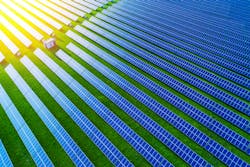U.S. Senate Passes American Energy Innovation Act
After a full year of hearings, business meetings, and bipartisan negotiations, U.S. Senators Lisa Murkowski (R-Alaska) and Joe Manchin, (D-West Virginia), released the text of their energy innovation package. The American Energy Innovation Act (AEIA) is a compilation of more than 50 energy-related measures considered and individually reported by the Senate Energy and Natural Resources Committee (ENR) last year.
The AEIA will modernize domestic energy laws to ensure the United States remains a global energy leader while also strengthening national security, increasing the country's international competitiveness, and investing in clean energy technologies.
The AEIA contains measures sponsored by more than 60 senators. Its key provisions focus on energy efficiency; renewable energy; energy storage; carbon capture, utilization, and storage; advanced nuclear; industrial and vehicle technologies; the Department of Energy (DOE); mineral security, cyber and grid security and modernization; and workforce development.
Policy Highlights
- Keeping energy affordable: The economy grows when energy prices are reasonable. While current market conditions have ushered in historically low prices for many resources, technological innovation made that possible and it is critical to plan for the future. With the world projected to use nearly 50% more energy by 2050, continued innovation is key to keeping energy affordable. The AEIA recognizes that both the government and the industry have important roles to play.
- Making energy cleaner: The AEIA will help keep energy affordable and simultaneously deliver cleaner energy that is better for human health and the environment. Instead of costly mandates or tax increases, the AEIA takes a technology-oriented but technology-neutral approach that will boost energy efficiency and lead to the development of a wide range of low- and zero-emissions energy options. This will lead to cleaner air and water, and help reduce the impacts of climate change.
- Strengthening security: America's mineral, cyber, and grid security remain critical threats. The AEIA recognizes that a supply chain disruption or a cyberattack, particularly on the electric grid, could have devastating consequences and takes meaningful steps to protect Americans against them.
- Increasing competitiveness: A steady supply of energy and raw materials is fundamental to the United States' ability to grow and prosper. The AEIA will help ensure that American manufacturers can use domestic energy and materials for their products — and it will help ensure those resources are produced safely and responsibly by a well-trained and highly-skilled workforce.
Consensus Legislation
Chairman Murkowski and Ranking Member Manchin will introduce the AEIA as a substitute amendment to S. 2657, a shell vehicle. As introduced, the AEIA contains measures sponsored or cosponsored by more than 60 senators that are arranged into two titles.
The first title focuses on American leadership in the research and development (R&D) of innovative energy technologies:
- Efficiency: The International Energy Agency has found that the pace of efficiency improvements is slowing. The AEIA will improve the efficiency of everything from schools to data centers while promoting weatherization and smart buildings.
- Renewables: The AEIA supports wind and solar technologies, extends hydropower incentives, modernizes marine energy research, and advances geothermal energy.
- Energy storage: The AEIA promotes promising storage technologies and facilitates pumped storage from clean hydropower.
- Carbon capture, utilization, and storage: The AEIA will modernize federal carbon capture, utilization, and storage R&D efforts and promote direct carbon removal to establish U.S. primacy in these key fields.
- Advanced nuclear: New nuclear technologies are smaller, scalable, and will offer clean, affordable baseload energy to communities, military installations, and other facilities. The United States developed nuclear energy and can regain its global leadership by pioneering advanced reactors.
- Industrial and vehicle technologies: The AEIA supports technological innovation in the industrial and transportation sectors, and encourages smart manufacturing that will bring good jobs back to America's heartland.
- DOE: The AEIA brings the DOE's authorities into the 21st century, renews essential programs like ARPA-E, and provides strategic direction in groundbreaking areas like high-performance computing.
The second title aims to improve U.S. national security in key areas and facilitate workforce development:
- Mineral security: The United States imports at least 50% of 46 minerals, including 100% of 17 of them. This is an insidious threat to both U.S. national security and international competitiveness. The AEIA complements the administration's actions and will help rebuild a strong domestic minerals supply chain for the American military and manufacturers.
- Cybersecurity and grid modernization: America's critical infrastructure — including the electric grid — faces millions of ever-evolving cyberattacks each day. The AEIA provides new mechanisms and incentives to protect cybersecurity and modernize the domestic grid.
- Workforce development: A well-educated workforce to fill jobs in key sectors is crucial for affordable energy. The AEIA addresses pressing needs for both energy-related companies and National Laboratories to ensure the United States has the best and most skilled workers in the world.
The full text of the AEIA is available here.
